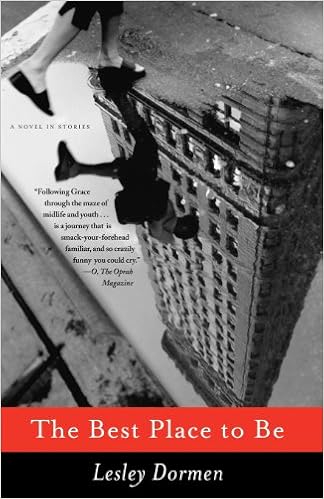I came to this collection sight unseen, and I am happy to have read it. The first couple of stories were especially exquisite, managing to do the usual contemporary story thing not so much with original flair as with sheer skill. Those early stories left me feeling as if I were reading the work of a master whose talent was so genuine, so impressive, that there really is a reason some people go on to find publishing success and others, while good writers, do not. Dormen's every word and phrase was fun to follow, and at the end of the story, chills ran through my body on what seemed a very simple turn of phrase. It's something I don't quite understand, the mystery of that chill, how some people can illicit such a thing at the end of a story that hasn't really gone anywhere in terms of action-filled plot. And Dormen's does over and over, though not quite with every story in the collection.
All the stories revolve around a singular character, a woman who remained single deep into her life and whose eventual marriage to a seemingly wonderful man is generally happy, though tinged with a certain amount of annoyance the longer it continues. The woman is a newspaper columnist and reporter, initially dispensing advice to single women but later just being the go-to on various subjects. She is the product of a single mother, whose three marriages each had the problems--the second man a seeming molester, the third a rich man who enables the mother's egregious spending (a habit her daughter emulates). The first is a man who has virtually now relationship with the woman and her brother until they are adults, which, in one story, is made to appear as if it were mostly the mother's fault. During the course of the stories, the mother dies, and the woman deals with her grief. In all, this is a portrait of a family as seen through the daughter's eyes.
The first story in the collection is my favorite, but I'll write of that one separately. The second story and the last story are my favorites next to that. The second story revolves around the narrator's life as an older single, one who has made bad choices in dating and who now feels as if she has put herself in a position from which she can never return--single forever. The last story in the collection is, in essence, about aging, though in all the stories, the woman appears to be around fifty or just thereafter. In this story, though, she is somewhat less taken with her husband and yet also happy for the security his presence affords her. The cause of this deep thought about her marriage is a newspaper article she agrees to write about marriage researchers.
"Curvy" recounts Alex and his sister going to meet Irv, their biological father, and his wife. Alex resents Irv for leaving them; the sister, a bit older, seems more understanding and even has mixed feelings about him versus her mother. "The Secret of Drawing" focuses on the narrator's start at college and on her mother's second divorce and on her taking up with a third man and on the feelings the narrator has for the man she calls dad (that second husband). "Gladiators" focuses on the siblings fighting one another over inheritance matters after their mother's death, and "General Strike" focuses on a Thanksgiving trip to Italy with her brother, his wife, and the narrator's husband. Here, one gets the feeling that the marriage is no longer so hot for the woman, but she is able to find some solace in reestablishing a relationship with her brother that reminds her of being young again.
It is really the first story that sets the stage for all of the others, by denoting how there are times in life when we are truly happy and how those times are transitory. It is a happiness contrasted immediately with that second story, which seems much less hopeful but which chronologically precedes the events in the first story. Later, those first story events are in the past, and sadness slowly seems to be reaching in again. Transitory, indeed.
Thursday, February 4, 2016
On "The Best Place to Be" by Lesley Dormen ****
Labels:
Books,
Collections,
Four-Star Collections,
Lesley Dormen
Subscribe to:
Post Comments (Atom)







No comments:
Post a Comment